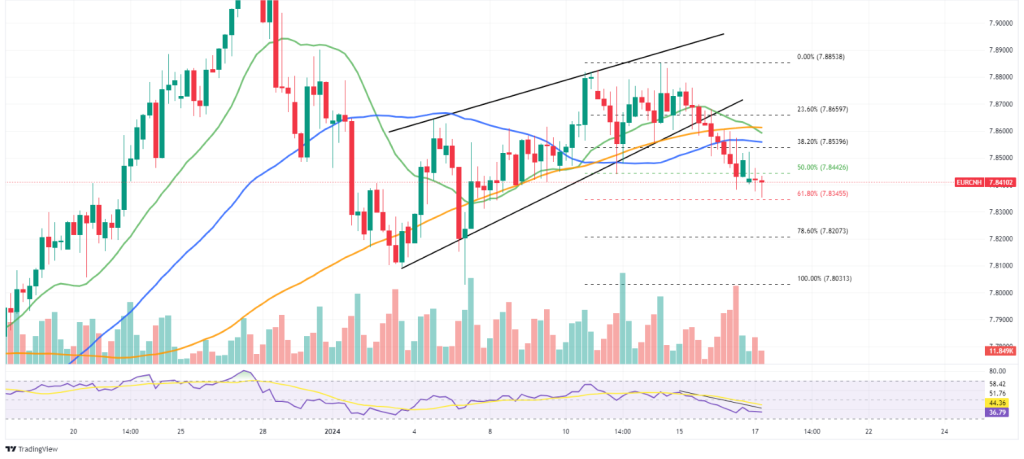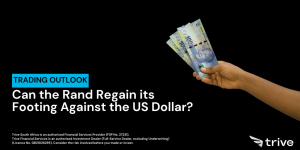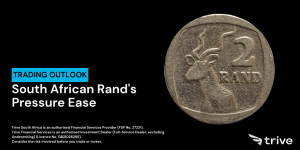
The EURCNH pair finds itself in a delicate position as mixed economic signals from China and divergent views among ECB officials impact market sentiment ahead of the crucial Eurozone inflation report, scheduled for release later today. On the one hand, China’s weak economic data, particularly the underwhelming GDP growth and retail sales figures, raise concerns about renewed stimulus measures from Beijing, potentially weakening the Yuan.
China’s fourth-quarter GDP growth of 5.2% missed market expectations and fell short of the government’s target, highlighting the ongoing struggles of the world’s second-largest economy. The property crisis, weak consumer demand, and global headwinds continue to dampen growth prospects. This lacklustre performance raises the possibility of further stimulus measures from the People’s Bank of China (PBoC), which could support the Yuan.
Meanwhile, the Euro draws strength from recent hawkish pronouncements by ECB officials. Joachim Nagel and Robert Holzmann, both influential policymakers, downplayed the prospect of near-term rate cuts, emphasizing the need to prioritize inflation control. This stance aligns with market expectations, which currently price in around 150 basis points of cuts from the ECB this year. The prospect of tighter-for-longer monetary policy in the Eurozone continues to boost the Euro against the Yuan.
Technical
The 4-hour EURCNH chart reveals a technical tug-of-war between bulls and bears. The price action currently sits nestled between the 50% and 61.80% Fibonacci retracement levels, following a break below key SMAs. The bearish sentiment is evident as the price trades below the 20-SMA (green line), 50-SMA (blue line), and 100-SMA (orange line). The RSI of 36.79 and its downward slope suggest a prevailing bearish trend.
Should the bears sustain momentum below the golden ratio, currently at 7.84102, a potential target lies at the 78.60% Fibonacci retracement level (7.82073). A breach below this level could bring the four-week low of 7.80313 into play.
Alternatively, if the bulls manage to sustain a push above the 50% Fibonacci retracement level, a potential short-term trading opportunity may emerge towards the 38.20% Fibonacci retracement level (7.85296). A break above the 38.20% Fibonacci retracement could confirm the bullish reversal, likely bringing the 23.60% Fibonacci retracement (7.86597) and a three-week high of 7.88538 into play.

Summary
The EURCNH pair faces a confluence of opposing forces ahead of the Eurozone inflation report. While China’s economic woes cast a shadow over the Yuan, the ECB’s hawkish tilt lends support to the Euro. Technically, the price action is at a crossroads, with the 50% and 61.80% Fibonacci retracement levels acting as key pivot points. A sustained push above the 50% Fibonacci retracement level could trigger a bullish run, while a break below the golden ratio could open the door for further bearish momentum.
Sources: TradingView, Trading Economics, Reuters, National Bureau of Statistics of China, Dow Jones Newswire.
Piece written by Mfanafuthi Mhlongo, Trive Financial Market Analyst
Disclaimer: Trive South Africa (Pty) Ltd (hereinafter referred to as “Trive SA”), with registration number 2005/011130/07, is an authorised Financial Services Provider in terms of the Financial Advisory and Intermediary Services Act, 37 of 2002. Trive SA is authorised and regulated by the South African Financial Sector Conduct Authority (FSCA) and holds FSP number 27231. Trive Financial Services Ltd (hereinafter referred to as “Trive MU”) holds an Investment Dealer (Full-Service Dealer, excluding Underwriting) Licence with licence number GB21026295 pursuant to section 29 of the Securities Act 2005, Rule 4 of the Securities Rules 2007, and the Financial Services Rules 2008. Trive MU is authorized and regulated by the Mauritius Financial Services Commission (FSC) and holds Global Business Licence number GB21026295 under Section 72(6) of the Financial Services Act. Trive SA and Trive MU are collectively known and referred to as “Trive Africa”.
Market and economic conditions are subject to sudden change which may have a material impact on the outcome of financial instruments and may not be suitable for all investors. Trive Africa and its employees assume no liability for any loss or damage (direct, indirect, consequential, or inconsequential) that may be suffered. Please consider the risks involved before you trade or invest. All trades on the Trive Africa platform are subject to the legal terms and conditions to which you agree to be bound. Brand Logos are owned by the respective companies and not by Trive Africa. The use of a company’s brand logo does not represent an endorsement of Trive Africa by the company, nor an endorsement of the company by Trive Africa, nor does it necessarily imply any contractual relationship. Images are for illustrative purposes only and past performance is not necessarily an indication of future performance. No services are offered to stateless persons, persons under the age of 18 years, persons and/or residents of sanctioned countries or any other jurisdiction where the distribution of leveraged instruments is prohibited, and citizens of any state or country where it may be against the law of that country to trade with a South African and/or Mauritius based company and/or where the services are not made available by Trive Africa to hold an account with us. In any case, above all, it is your responsibility to avoid contravening any legislation in the country from where you are at the time.
CFDs and other margin products are complex instruments and come with a high risk of losing money rapidly due to leverage. You should consider whether you understand how these products work and whether you can afford to take the high risk of losing your money. Professional clients can lose more than they deposit. See our full Risk Disclosure and Terms of Business for further details. Some or all of the services and products are not offered to citizens or residents of certain jurisdictions where international sanctions or local regulatory requirements restrict or prohibit them.




